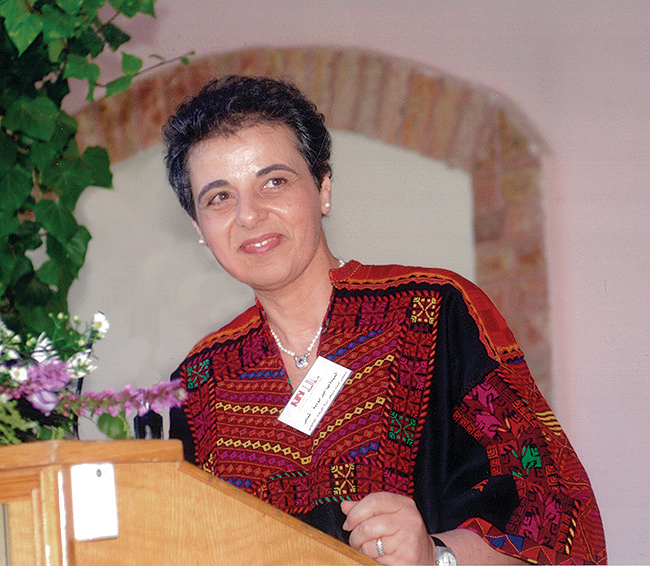When Maha Abu Dayyeh passed away on January 9, my brother and I lost a loving mother, many lost a loyal friend, and Palestine lost a visionary, humble, and relentless advocate. A native of Jerusalem and Beit Jala, Maha was co-founder and executive director of the Women’s Centre for Legal Aid and Counseling, a leading women’s rights organization that, for the past 24 years, has provided legal and social services and advocates on behalf of Palestine’s women. She was also involved in numerous international initiatives and was a regular contributor to local, national, and international conversations about Palestine and women in conflict. Among Maha’s most prideful moments was her central role in conceptualizing, preparing for, and launching the Palestinian Model Parliament in the 1990s, an initiative that explored ways that Palestinian women would be able to insert their voices into the budding Palestinian national discourse in the wake of the Oslo Accords.
For Maha, her work on the rights and status of Palestinian women was inextricably linked to the Palestinian struggle for national liberation. She believed that respect for Palestinian human rights required thinking about and respecting rights at the private level. Similarly, she argued that the status and experience of Palestinian women could only be improved if the root causes of their plights were addressed. These included the abusive Israeli occupation and control of Palestinian daily life, militarism, and the resulting economic and social pressures. She persuasively articulated that continuity, informed by decades of experience. Her fluency in navigating the minutiae of complex local dynamics while also thinking broadly and strategically are what made her an effective advocate on behalf of her clients and the broader movement.
Perhaps most importantly, Maha never lost sight of the individuals, the clients, and the countless women and men for whom she felt a sense of fierce protectiveness that I so often benefited from as her daughter. Many dinners were interrupted as my mother would get a phone call to troubleshoot a particularly difficult or urgent case at the center – calmly and skillfully handling the complicated dance between the Palestinian and Israeli authorities and complex familial and societal dynamics to ensure that the woman was best served. Twenty years into doing this work, she never lost her outrage or her compassion. She never got used to the stories she heard.
Maha brought her experience and perspective as a hands-on human rights defender to the international political discourse on Palestine, where she and like-minded colleagues warned against pursuing political solutions without giving thorough consideration to human security. But her political work was also fiercely independent. She resisted partisan politics in a place where they are too often dominant and seemingly required for admission to the public conversation. She secured her admission on her own terms. Though she gracefully sheltered her family as best she could, we still learned – usually after the fact – that she paid the price for her principles.
Yet her independence inspired deep respect from even the most unlikely quarters. The humbling presence of people from all persuasions, parties, and walks of life at her funeral and wake was perhaps the most powerful testament to this. Many spoke of her calm and attentive demeanor and leadership style. Creative and strategic, she would carefully listen to others’ opinions and urge everyone to speak before weighing in herself. She wasn’t a big talker – but when she talked, everyone listened.
At home, we benefitted from that same leadership style. My mother was not one to separate the public positions she took from the way she lived her life. Though she was extremely protective of us, she never told my brother or me what to do, how to act, or how to think. She never judged us but watched carefully, quietly, fondly, and often quite worriedly, as we fumbled through the complexities of life here, developed our own opinions, and wrestled with our own struggles. Advice was less often dispensed than demonstrated. My mother’s eminent practicality belied deep wisdom, one which I frequently sought as I faced my own challenges. I witnessed many others do the same: her friends, my own friends, her colleagues, and her family – as well as near strangers.
As I rummage through old photographs, I am struck by how expressions that I knew so well had accompanied her from as far back as her early teens. There was the warm, inviting, and elegant smile; but also a wary, defiant look that never underestimated the size of the challenge ahead of her.
In her long struggle with cancer, she was no different. Where some saw a battle, my mother saw a dance. In her final weeks, she told us not to see the many hospital visits and medical interventions as an antagonistic fight. “We need to dance,” she told me in our last visit to the emergency room. And indeed, at her son’s Jerusalem wedding only 11 days before her death, she overcame her weakness and late-stage cancer to do just that.
Our family is very proud of my mother. We have derived tremendous support from those who have not only shared our grief but also our celebration of her life. We hope that her spirit and her work will live on among others in Palestine – and that we may all continue her dance.
Diala Shammas


